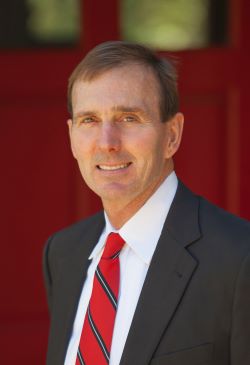This is the first in a series of interviews with people who are transforming the way business is done. This interview is with John Montgomery, talking about how – and why – the B Corp was created.

John Montgomery is among the best corporate lawyers in the country. He was one of the chief architects of the California benefit corporation, which became law in 2012. And he has continued to be highly influential as an international advocate for the B Corp, as it’s affectionately known.
He’s out to change the structure, and the heart and soul, of Capitalism. And he has both the legal mind and philosophical depth to do it. As the founder of a company called Lex Ultima, he is creating positive global impacts as a lawmaker, changing the current code of corporate behavior, and guiding a new generation of leaders who will bring a highly-developed sense of conscience to business.

A Value Shift. From Fear to Love.
Leslie: When you were running a very successful Silicon Valley law firm, you experienced a major a sea change. What was it about?
John: Sure. When I started the law firm in 2003, I had observed about a dozen wildly successful startup companies. I saw that there was a common developmental pattern across those companies. My thesis was to set the law firm up as an incubator and attract brand new startup companies that were willing to follow this particular developmental pattern. My thought was that if we offered discounted legal fees and got a little bit of equity, we would have more successful startups than average. We’d share in our clients’ successes, and they would get the benefit of discounted fees.
So, that was the thesis. It turned out that I had only understood about 20% of the developmental pattern. Just to make a long story short, this led me deep into developmental theory, social neuroscience, the neuroscience of leadership, the science of consciousness, the science of mind, psychology, and the evolutionary biology of tribes. There was something magical going on in these companies in addition to this developmental pattern that I saw.
To make another long story very short, what I concluded was that we humans – to grossly summarize developmental theory – have basically two speeds. We are either fear-based or love-based. Since most of us haven’t figured out how to cease being victimized by our limbic system, we tend to be reactive and fear based.
Leslie: I’ve had my own experiences in fear-based companies. What’s the antidote?
John: Most leaders lead their businesses out of fear. It’s power over, power under. I observed that when you lead a business from the heart, people are happier and more productive, and you get half the employee turnover. It’s a competitive advantage. More importantly, if you do it right, you can unleash a collective flow state that we’re all hardwired to perform our best in, where we are better able to access creativity, collaboration, cooperation, and the higher brain faculties.
Here’s what inspired me on this journey. You could walk into 12 companies that I profiled in a book, and you could feel the electricity. You could feel the energy. It was palpable the minute you walked into the lobby. Essentially, I spent 15 years trying to figure out what the heck was going on with the belief that I could reverse engineer it, so we could build better startups. That was my first major shift (or thesis) and the first aspect of what I got out of being a corporate lawyer in Silicon Valley.
Leslie: This observation was huge for you and your law firm. What happened next?
John: My second big shift… was that I started wondering why good people like you and me, Leslie, who follow the golden rule in our private lives, get into the board room and without any advice from counsel, allow the rule of gold to take over. In the boardroom that means that the doctrine of shareholder primacy becomes the moral compass.
What’s the doctrine of shareholder primacy? It’s the belief that the corporation has one legitimate purpose, which is to maximize stockholder welfare or maximize profits for shareholders. And it’s morally acceptable to foist as many of the negative consequences of corporate behavior onto society and the environment, as you can possibly get away with.
This is called “externalizing your costs.” And essentially what I realized was that I had been part of a global economic system populated by multinational corporations that are prone to sociopathic behavior. We’ve normalized a code of conduct and a moral compass for corporations where it’s okay to put the maximization of profit on the pedestal as the highest of all core values, and it’s okay to optimize the externalization of negative costs onto society and the environment. As I woke up to this reality, I got into the history of the corporation and traced how it came to lack a conscience. So I set about to endow the corporation with a conscience. That’s how I got involved in helping to create the benefit corporation.
Leslie: Could you talk more about the benefit corporation, and how it shifts the emphasis for business, and benefits all of us?
John: Ironically, I was originally inspired by performance. Wouldn’t it be great to apply what we know about the human psyche and psychology to the collective life forms known as corporations? In theory, we could teach people how to lead corporations that are optimized for how human beings work best. If we did that, we’d have far better economic performance and happier people. If everyone ran their companies as benefit corporations, we’d have a much healthier and more sustainable economic system.
These are the two takeaways from my career. The first, love is a far better operating system than fear. The second, the “C” corporation that we all know, love and take for granted is unwittingly designed to be prone to sociopathic behavior and needs to be fixed.
Leslie: Naturally I’ve read about you. I know you were involved in creating the California benefit corporation law. Can you tell us what you personally did, how you were involved in creating the benefit corporation?
John: Well, much of the credit for benefit corporation legislation goes to Bill Clark in Philadelphia. Bill is considered by many to be the grandfather of the benefit corporation legislation. I was invited by Bill back in 2008 to comment on a white paper that he and Larry Vranka co-authored: The Need and Rationale for the Benefit Corporation which included what’s known as the Model Benefit Corporation Legislation. When we began work on the California benefit corporation legislation in 2010, Bill and his team had already drafted the Model Benefit Corporation Legislation, which had been more or less adopted in five other states.
Maryland was the first, but the first five were relatively small states. The theory went: if California adopted the benefit corporation legislation, because it’s the largest state, the rest of the country would follow. We basically worked with the best of the Model Benefit Corporation Legislation, and the lessons learned from the legislative process in the five proceeding states. Three of us lawyers – we called ourselves the “tres amigos” – drew up the legal documents. And we worked with Jared Huffman, then a California Assemblyman, to draft the California legislation. So, we didn’t draft it from scratch. We had five pioneering states that had gotten legislation through. We had Bill Clark’s Model Legislation, and we were off to a running start.
Leslie: With all that in mind, there’s so much in the news about the Lyft IPO, and the other IPOs coming along, Airbnb, and other companies that are considered part of the “sharing economy.” How do you see their professed values surviving in the face of shareholder value?
John: Well, let me give an overview of just how the corporate law really works in America, especially with respect to public companies. There’s a little state called Delaware, that figured out in the 1800s that if you created a corporate statute and had special courts, business courts with judges that are trained in business, you could attract a lot of the largest corporations to your state to collect franchise taxes. So, Delaware is home to a majority of The Fortune 1000 and it is the bellwether in corporate law in the United States. So, under Delaware Law, the corporation has one legitimate purpose according to the current presiding Delaware Supreme Court Justice, Leo Strine. That purpose is to maximize stockholder welfare. That’s the sole legitimate purpose of a regular Delaware corporation.
Now, most Silicon Valley companies, when they go public, are either California or Delaware. I checked Lyft, and it’s Delaware. If you’re a Delaware Corporation, the law is pretty settled. At the end of the day, the company has one legitimate purpose: to maximize stockholder welfare. And the directors have fiduciary duties only to shareholders to maximize stockholder welfare. That’s the moral compass at the core of a Delaware Corporation. Even if you’re a Minnesota company or a California company or whatever, the doctrine of shareholder primacy, in my experience, generally prevails in the boardroom by law or custom.
So, let’s take Lyft or another company like Pinterest, or some of the many companies that are going public. They may have a nice guy image but you have to look to their state of incorporation. It’s usually Delaware. Then look at the board composition because these companies, at the end of the day, are out to make money for shareholders. Period, end of story. That’s their raison d’etre.
They may tell a good story, like Lyft is nicer than Uber, and it has values and it treats its people well and so on and so forth. And yeah, that may be true, but at the end of the day, these are collective life forms that do their best to disguise what’s going on in the boardroom when nobody’s looking. By law, that collective life form is required to do one thing and one thing only: maximize stockholder welfare.
That’s the inherent tension at the core of these companies. I know too much about corporate law and how things really work in a board room. I’m pretty cynical or jaded, or maybe I’m just realistic because when push comes to shove, a company like Lyft will come under pressure to maximize stockholder welfare. That is going to be the core value that trumps all others.
Leslie: Thanks for your sharing your wisdom on the state of the corporation, John. We’ll be publishing Part Two of this interview in a couple of weeks: The conscience that’s built into the B Corp.
Leslie:
Thanks much for publishing this.
Joel